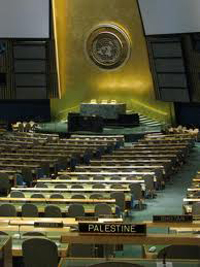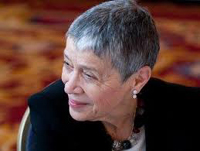Could Obama Support Palestine in UN?
 |
The Palestinian leadership is seriously considering a concrete plan to seek membership in the UN. In July the Palestinians would ask the Security Council to recommend a seat for their new nation. Barack Obama keeps on saying that the U.S. will veto the request, and all the experts seem to agree.
Except Gabriela Shalev, who may have more claim to expertise than most. She was Israel's ambassador to the UN from 2008 to 2010. A few weeks ago she told a committee of the Knesset, Israel's parliament, that "the United States is not interested in vetoing the UN's recognition of a Palestinian state."
According to Akiva Eldar, one of Israel's leading foreign policy analysts, Shalev said she "would not be surprised if Obama instructs ... America's Ambassador to the UN, Susan Rice, to hold back on the veto weapon this time. By Shalev's count, the Palestinians have already succeeded in recruiting nine members of the Security Council - the number necessary for recommending to the General Assembly to accept a new member state to the UN. The Americans, adds Shalev, are not eager to use their veto and to take comfort from the isolation in Israel's arms."
That isolation must surely be on Obama's mind. Why else would he run the risk of publicly committing the U.S. to a peace based on the 1967 borders (with minor, mutually agreed adjustments) - a blazing red flag for right-wing Israelis, as their prime minister, Benjamin Netanyahu, made clear at the White House. It's the strongest sign yet that Obama wants desperately to move the peace process along so he can avoid having to cast a vote at the UN, because he faces serious consequences whether he vetoes or not.
With the political tide moving so swiftly in support of a Palestinian state, there's no guarantee that even the closest U.S. allies will oppose it. If Obama moves with that tide and supports Palestinian statehood at the UN, he'll pay an unpredictable but no doubt heavy political price at home, with an election looming.
Yet if he resists the tide, his veto would leave the U.S. supporting, more visibly than ever, an Israel that has become a pariah state, in much the same way that South Africa once was. For a president whose foreign policy is based on restoring American moral leadership and multilateral cooperation, that would be a heavy blow - one he might choose to avoid whatever the domestic political price.
 |
So Gabriela Shalev's prediction that the U.S. will avoid the veto makes sense, even though it's been thoroughly ignored by the U.S. media, both corporate and progressive, who assume that Obama will order that veto. After her two years at the UN, where Israelis and Americans work closely together, she just may know something the rest of us don't know.
On the other hand Shalev may only have been spinning a trial balloon meant to influence Israeli domestic politics. At that same Knesset meeting former Mossad chief Efraim Halevy warned that Israel ought to be actively pursuing peace rather than "hiding its head in the sand" and waiting for the UN vote in September.
Shalev and Halevy are part of a growing chorus of Israelis who once held top government and security posts and are now calling on Netanyahu to get serious about peace. Even the current defense minister, Ehud Barak, wants his government to "seriously consider" a French plan for peace talks based on the '67 borders.
If Shalev's words were political spin, they are still a useful reminder of that powerful and growing contingent among the Israeli political elite who support Obama's call for immediate talks to set the border of a new Palestinian state (which would also give Israel a legally declared border for the first time).
They want Obama to keep pressing Netanyahu to move in that direction. The more Obama pushes, the more support he garners among Israeli centrists as well as liberals. The centrists worry that if Palestinians gain recognition from the UN without any settlement with Israel, it will trigger unpredictable conflict. Halevy calls it "the September events, which could come in waves against Israel's population."
But it's far more likely that the events will come in waves against the Palestinians, who always suffer far more than the Israelis when the two sides come to blows. That's the crucial point that most Americans so easily forget. Spurred on by their president's promise to guarantee Israel's security, without ever mentioning the Palestinians' security, they assume that the Israelis are the ones at risk.
As Israel's world-fame expert on military strategy Martin Van Creveld has pointed out, Netanyahu's claim that the pre-'67 borders are "indefensible" makes no sense. He's just touting the widely-believed but wholly inaccurate myth of Israel's insecurity. Israel would be perfectly secure within its pre-'67 borders, alongside a new Palestinian state in the West Bank and Gaza. In fact, Israelis would be much more secure as long as those borders were mutually agreed on, because the motive for Palestinian attacks would vanish.
If enough Americans come to realize that a two-state solution along the '67 borders (with minor adjustments) will make Israel as well as the Palestinians and the U.S. more secure, Obama just might feel politically safe enough to tell the Israelis he will not give them that UN veto. Then Netanyahu will show up at the negotiating table, ready to make serious compromise, so fast it will make our heads spin.
As Gabriela Shalev reminds us, it's foolish to assume that Obama is merely a puppet with Netanyahu pulling the strings. Her two years at the UN surely taught her that the real power is in Washington, not Jerusalem. But it's only U.S. political opinion holding Obama back. So even more power lies with the American people. Progressives who care about justice for Palestine should be in the thick of the political battle, fighting to make their voices heard in the Oval Office.
Source: The Huffington Post - Ira Chernus
Topics: Barack Obama, Benjamin Netanyahu, Foreign Policy, Occupation, Palestine Channel: Opinion
Views: 2723
Related Suggestions





























